Harare
October 20th - October 25th, 1999
This travel Wednesday starts very early, as we've got a 300 kilometer
drive to get to Harare and with our Land Rover Spot in its weakened condition,
it could take as long as six hours. Our goal is to arrive early enough to
miss the Harare rush hour, a legendary ordeal we've heard rumors of as far
south as Johannesburg. The road was kind to us this day, and we arrived
at Kathy's friend Patty's house just before 2PM. We were even fortunate
to drive by and note the Land Rover parts distributor for all of Zimbabwe
in the southern and smoggy industrial section of town.
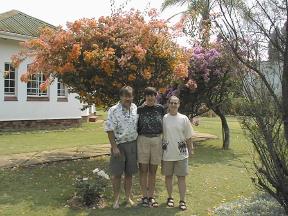 Our original plans had called for us to arrive in Harare
on Friday the 22nd, when Patty and her husband Martin (at left) were expecting
us. So we attempted to get a room to stay at a local backpacker's lodge,
but Zimbabwe isn't South Africa and what few inexpensive places there were
in town were already full. So, we called Patty and Martin up, and they said
"of course you can stay here early." They were very gracious to
take time out of their very busy working day to make us feel at home.
Our original plans had called for us to arrive in Harare
on Friday the 22nd, when Patty and her husband Martin (at left) were expecting
us. So we attempted to get a room to stay at a local backpacker's lodge,
but Zimbabwe isn't South Africa and what few inexpensive places there were
in town were already full. So, we called Patty and Martin up, and they said
"of course you can stay here early." They were very gracious to
take time out of their very busy working day to make us feel at home.
Jim began work in earnest on Spot, and with a country-sized warehouse
of parts just a few kilometers away we were quickly back up to full power.
The job was made a bit more difficult than usual as even Land Rover is confused
about which part is which as far as Spot's engine is concerned. Seems that
the left and the right side carburetors are mirror images of each other,
and the parts don't interchange. Of course, Land Rover's parts database
has them mixed up. Fun, fun!
After the hectic pace we've kept up the last few weeks, Harare life proved
to be a welcome relief. With Patty and Martin working during most of the
day, we were afforded a chance to relax and catch up on some life maintenance
tasks. At night, we would check out whatever restaurant or venue offered
the "hot spot" that evening in town, and we found ourselves immersed
in a fair amount of debate on freedom in Zimbabwe and other forms of political
dialog and satire. Seems the situation here is far from happy, but more
on that later.
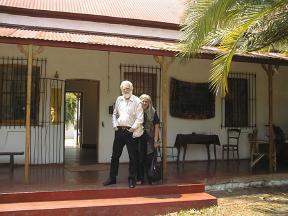 One of our outings was to visit a Zimbabwean
art gallery run by two friends of Patty and Martin, Derrick and Helen (to
the left). They specialize in picking out the new and promising talent from
Zimbabwe's very large pool of artists. Much of what we saw attempted to
bring Zimbabwe's past culture and set it in a modern perspective. Much of
the gallery's exhibits were on the lawn that day, and below are a couple
of shots of works we found of interest.
One of our outings was to visit a Zimbabwean
art gallery run by two friends of Patty and Martin, Derrick and Helen (to
the left). They specialize in picking out the new and promising talent from
Zimbabwe's very large pool of artists. Much of what we saw attempted to
bring Zimbabwe's past culture and set it in a modern perspective. Much of
the gallery's exhibits were on the lawn that day, and below are a couple
of shots of works we found of interest.
Hiking
On the weekend, Patty and Martin took us to one of their favorite hikes
near Harare. Nestled on a rocky outcrop are a number of 4000-5000 year old
rock paintings, and we had a wonderful day exploring the scenery and gazing
at the ancient art. Here they are posing in front of one of the rock hills
in the above left photo. The rightmost photo shows Kathy and Patty viewing
an ancient cave painting of a elephant.
This outing also introduced us to Zimbabwe's tiered tourist pricing system.
Each tourist destination has three entry fees: the regional, national and
international rates. Those who live near the tourist site pay the lowest
regional fee, usually less than one dollar US. All other residents of Zimbabwe
pay the national rate; depending upon the popularity of the park, this can
range from $1 US to $3 US. Us international visitors have the privilege
of paying the most: usually somewhere between $10 and $20 US. Guess they
figure that if you've come this far, you're not going to let a handful of
dollars stop you. The rates for international are also posted in US dollars,
not Zimbabwe dollars; seems that tourists are a major source of hard currency
.
The Ugly Side of International Journalism
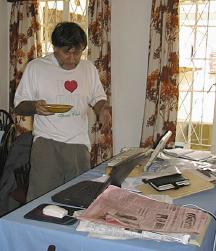 Kathy and Jim are both veterans of working at home, so we
can truly appreciate the effort and sacrifice both Patty and Martin (who
both work at home) went through to put us up for a week. We really appreciated
it. In particular, hat's off to Martin who works as a financial journalist
for several foreign economic publications. The week we visited was the week
the Zimbabwe government presented the budget for the next year, so his normally
busy week was even more zany than usual. Here in the photo to the left he
wins the perseverence award for pounding away on an article with a noon
Sunday deadline even though the Saturday evening saw us finish off many
bottles of wine over Thai food.
Kathy and Jim are both veterans of working at home, so we
can truly appreciate the effort and sacrifice both Patty and Martin (who
both work at home) went through to put us up for a week. We really appreciated
it. In particular, hat's off to Martin who works as a financial journalist
for several foreign economic publications. The week we visited was the week
the Zimbabwe government presented the budget for the next year, so his normally
busy week was even more zany than usual. Here in the photo to the left he
wins the perseverence award for pounding away on an article with a noon
Sunday deadline even though the Saturday evening saw us finish off many
bottles of wine over Thai food.
In Zimbabwe, international journalism can be even uglier than usual.
Martin once produced articles that focused more on social and political
issues, but switched to financial in order to avoid the heavy-handed tactics
wielded by the Zimbabwe government against journalists critical of President
Mugabe and his cronies. He figures he would have gotten into real trouble
by now otherwise; the Zimbabwe government regularly torches the homes of
journalists and other individuals that get under their skin. Seems it's
Mugabe's favorite technique.
Even though he only writes about financial issues, Martin still manages
to get into plenty of hot water. For example: Mugabe blames Martin for the
last crash of the Zimbabwe dollar when it went from 22 or so to the US dollar
to 40! Seems Martin late one afternoon caught wind through his sources that
the market had lost confidence in the Zim dollar and that the banks weren't
buying them at anything more than 38 to the dollar. He reported this in
an article that ran the next morning when the blood bath occurred. It would
have happened anyway once the banks' new policies became apparent; just
that now the government has someone it can point the finger at. Patty and
Martin were nervous for some time after that, as the threats were many and
specific.
An Abusive Government
Martin considers himself lucky, compared to how black journalists are
treated in Zimbabwe. Early in 1999 two journalists, Ray Chotoa and Mark
Chavanduka, were arrested and tortured for several weeks about an article
they wrote on a possible coup plot being formed by low level army officers.
Turns out the two didn't get the story straight and were eventually released,
but the chill it sent out throughout the country has yet to thaw.
Such techniques are not unusual for Mugabe and the Zimbabwe government.
He and his army have even resorted to ethnic massacres to quiet dissent.
Mugabe and his government come from the Shona tribe, and it seems that back
in 1983 the N'debele tribe near Bulawayo, the second largest ethnic group
in Zimbabwe, had real problems with some of Mugabe's policies and threatened
action. Mugabe responded by sending in the army, resulting in the slaughter
of 20,000 N'debele over the course of a year. These are a people that supported
Mugabe in his struggle against the Rhodesian government, so we see how thin
allegiances are here.
Mugabe even gained his office through intimidation. Seems that during
the campaigning before the 1980 election that ushered in the current majority
government, Mugabe put into place a rural network of domestic terrorists
that killed and threatened opposition and voters alike to ensure a Mugabe
victory. The white Rhodesian government caught wind of this just before
the election, but when they moved to arrest Mugabe and delay the election,
the British government, who were acting as international overseers and had
moles within the Rhodesian government, stood in their way, basically telling
them this is Africa and let "them" do it their own way. The British
and Thatcher's government abrogated their responsibility as overseers and
allowed a violent and abusive group of men into power.
The african story plays out this way so often, and in Zimbabwe one can
see some of the root causes. It took violent men to engineer the end of
the Rhodesian government and oppressive white rule, and once in control
of the government these men are not enlightened enough to step back from
their violent ways. They see themselves ruling in the manner of African
tribal chiefs, with absolute power and until death. Democracy and representative
government to them means a facade one must maintain in order to have respectability
in the international arena. The end of colonialism in Africa has provided
these small men a means to absolutely control not just a local tribal group
but the entire nation-states left behind by the Europeans.
The final irony of all this can be seen by how little the body of law
has changed in Zimbabwe: Rhodesia instituted some of the most invasive and
oppressive laws in order to allow police control of the black population
and its dissidents, Mugabe included. Mugabe's government has left all of
these laws in place, and use them regularly to keep the population in line
and kill all objections to Mugabe's abuses. As Americans, we're appalled
at the practices here in Zimbabwe and outraged that organizations funded
by the US such as the IMF and World Bank regularly give funds to a government
we view as dangerous. Zimbabwe is one country the west should stop giving
money to until the worst of the abuses are ended.
Thanks again!
Many thanks to Patty and Martin for putting us up and putting up with
us during their busy weeks. Harare would have been just another dirty and
smoggy African capitol had they not shown us Harare's brighter side, and
we wouldn't have left Harare as refreshed and recharged as we did. Much
appreciated!
 Our original plans had called for us to arrive in Harare
on Friday the 22nd, when Patty and her husband Martin (at left) were expecting
us. So we attempted to get a room to stay at a local backpacker's lodge,
but Zimbabwe isn't South Africa and what few inexpensive places there were
in town were already full. So, we called Patty and Martin up, and they said
"of course you can stay here early." They were very gracious to
take time out of their very busy working day to make us feel at home.
Our original plans had called for us to arrive in Harare
on Friday the 22nd, when Patty and her husband Martin (at left) were expecting
us. So we attempted to get a room to stay at a local backpacker's lodge,
but Zimbabwe isn't South Africa and what few inexpensive places there were
in town were already full. So, we called Patty and Martin up, and they said
"of course you can stay here early." They were very gracious to
take time out of their very busy working day to make us feel at home. One of our outings was to visit a Zimbabwean
art gallery run by two friends of Patty and Martin, Derrick and Helen (to
the left). They specialize in picking out the new and promising talent from
Zimbabwe's very large pool of artists. Much of what we saw attempted to
bring Zimbabwe's past culture and set it in a modern perspective. Much of
the gallery's exhibits were on the lawn that day, and below are a couple
of shots of works we found of interest.
One of our outings was to visit a Zimbabwean
art gallery run by two friends of Patty and Martin, Derrick and Helen (to
the left). They specialize in picking out the new and promising talent from
Zimbabwe's very large pool of artists. Much of what we saw attempted to
bring Zimbabwe's past culture and set it in a modern perspective. Much of
the gallery's exhibits were on the lawn that day, and below are a couple
of shots of works we found of interest.

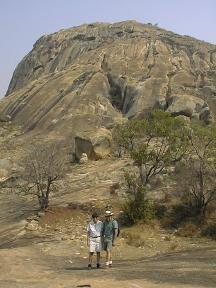
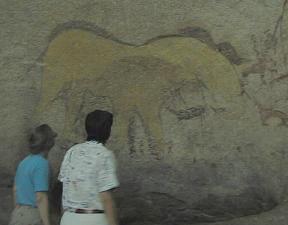
 Kathy and Jim are both veterans of working at home, so we
can truly appreciate the effort and sacrifice both Patty and Martin (who
both work at home) went through to put us up for a week. We really appreciated
it. In particular, hat's off to Martin who works as a financial journalist
for several foreign economic publications. The week we visited was the week
the Zimbabwe government presented the budget for the next year, so his normally
busy week was even more zany than usual. Here in the photo to the left he
wins the perseverence award for pounding away on an article with a noon
Sunday deadline even though the Saturday evening saw us finish off many
bottles of wine over Thai food.
Kathy and Jim are both veterans of working at home, so we
can truly appreciate the effort and sacrifice both Patty and Martin (who
both work at home) went through to put us up for a week. We really appreciated
it. In particular, hat's off to Martin who works as a financial journalist
for several foreign economic publications. The week we visited was the week
the Zimbabwe government presented the budget for the next year, so his normally
busy week was even more zany than usual. Here in the photo to the left he
wins the perseverence award for pounding away on an article with a noon
Sunday deadline even though the Saturday evening saw us finish off many
bottles of wine over Thai food.